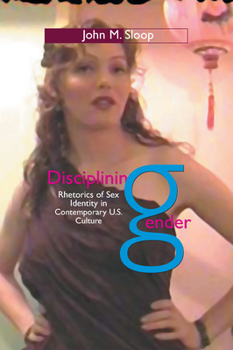Disciplining Gender: Rhetorics of Sex Identity in Contemporary U.S. Culture
Select Format
Select Condition 
Book Overview
An expert on the rhetoric of the mass media, John M. Sloop has written several books on how the spoken and written word can influence political and cultural debate. In Disciplining Gender, he turns his attention to a topic that has attracted widespread public discussion--the treatment of gender ambiguity in American culture. He offers critical readings of five cases, showing the extent to which, in each instance, public discourse and media representations have served to reinforce dominant norms and constrain or "discipline" any behavior that blurs or subverts conventional gender boundaries. The five cases include John/Joan or David Reimer, Brandon Teena, k.d. lang, Janet Reno, and Barry Winchell/Calpernia Addams. Sloop draws on queer theory and research in the field of critical rhetoric to examine representations of "gender trouble" in these much-publicized stories. In each case, he provides a comprehensive analysis of the public discussions of their significance. In short, rather than simply study the people and circumstances involved in each case, he examines the public meanings attached to them and the implications of those meanings for how contemporary culture comes to understand what "man" and "woman" mean and which sexual behaviors are appropriate and inappropriate. In highlighting the ideological constraints imposed by our society, Sloop also suggests the ways that these constraints might be loosened and understandings of gender and sexuality diversified.
Format:Paperback
Language:English
ISBN:1558494383
ISBN13:9781558494381
Release Date:May 2004
Publisher:University of Massachusetts Press
Length:208 Pages
Weight:0.45 lbs.
Dimensions:0.6" x 6.0" x 8.9"
Grade Range:Postsecondary and higher
Customer Reviews
1 rating
Great Book for Teaching
Published by Thriftbooks.com User , 17 years ago
I have taught this book in both my introductory graduate seminar on Feminism and Rhetorical Theory and my undergraduate upper-level course on Gender and Communication at Indiana University. In both instances, *Disciplining Gender* manages to provide a text that my students find timely and accessible, as well as a text that I believe pushes them intellectually and politically. For graduate students, I beleive it offers one exemplar for how they could model a media-based dissertation; for undergraduates, the chapters provide an exemplar for how to critically examine a popular figure/event as part of broader structural stakes in U.S. public culture. In other words, the book models a type of scholarship I hope to help my students write. Overall, *Disciplining Gender* aims to question a naive optimism some derive from Judith Butler's arguments in *Gender Trouble* by asking us to re-consider when troubling gender has led to less utopian outcomes of gender terrorism (including death, assault, ostricism, and so forth). As part of a larger conversation in queer studies, Sloop's book also provides a great text for provoking class discussion about the limits of theories of social construction (as well as the possibilities) and the differences we too often blur between the categories of "sex," "gender," and "sexuality."





